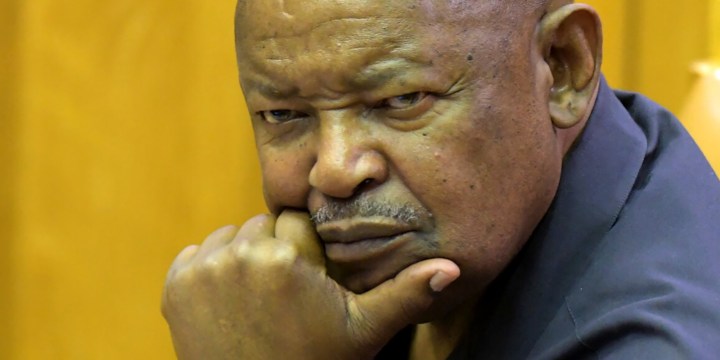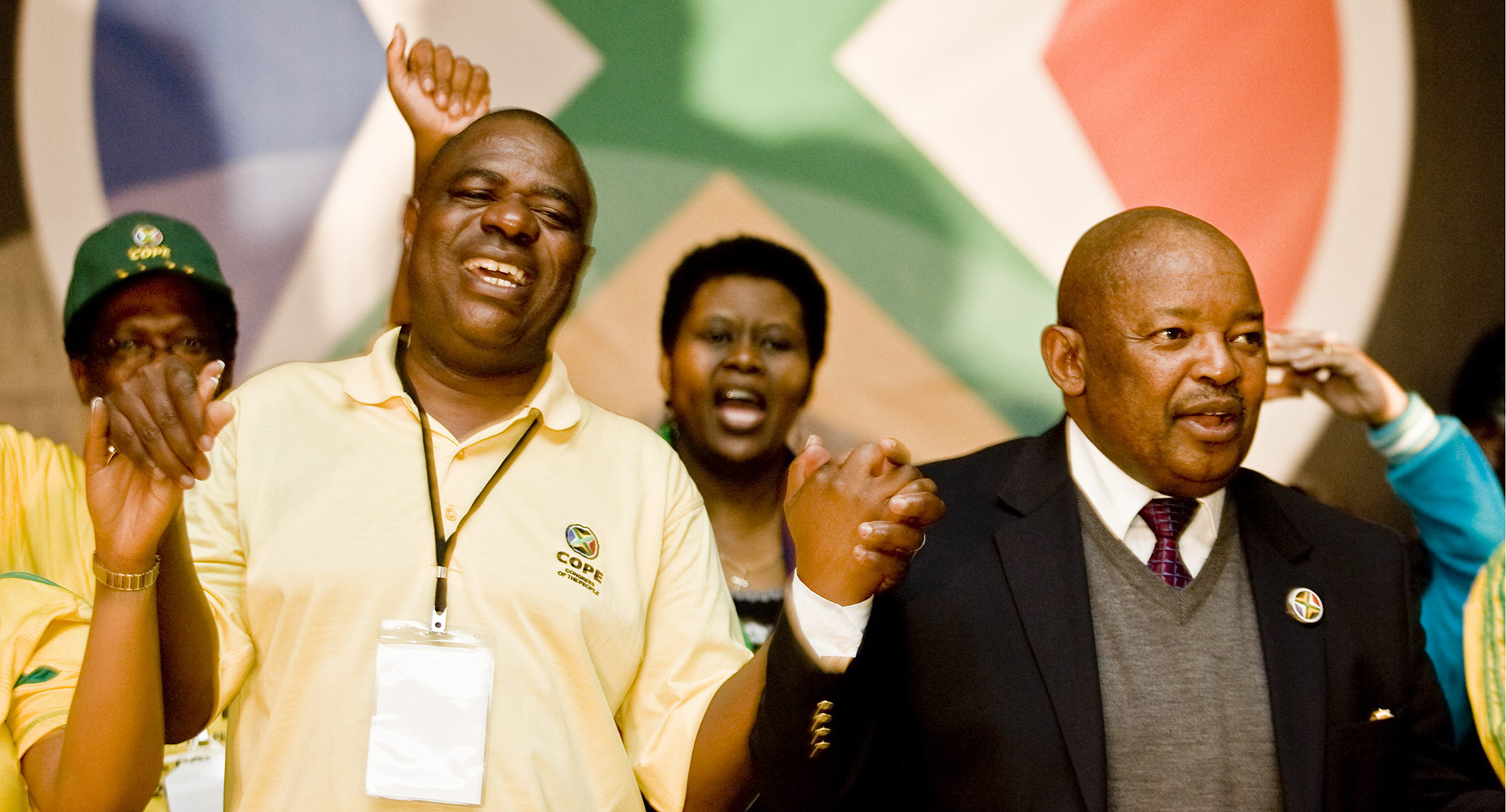ANALYSIS
No-hope Cope proves how tough life is for small-time political parties in South Africa

As voters appear to despair over their lack of options, Cope’s cautionary tale illustrates why so few bigger parties manage to attain durability in the South African political space-time continuum.
The recent series of disputes within the Congress of the People (Cope) and the very real possibility that it may now cease to exist in any meaningful way demonstrate how difficult the road ahead is for those who wish to form political parties in South Africa.
This tragicomedy also serves as a reminder of how difficult it is to have a proper internal democracy and why many smaller parties hardly ever changed their leaderships. This points to why there are so few parties that can successfully contest for power and why voters are turning away from the polls.
This week, Cope’s spokesperson, Dennis Bloem, said that the party’s leadership had taken the decision to suspend its leader Mosiuoa Lekota.
Lekota, in turn, responded that he had suspended the rest of the party’s leadership.
Bloem claimed to have not been suspended.
Then, on Wednesday, Lekota tried to hold a press conference that saw party members punch each other in full view of HD television cameras.
[BREAKING NEWS] COPE members physically attack each other during their media briefing.
Tune into #Newzroom405 for more details. pic.twitter.com/5ZfRYu4nXS
— Newzroom Afrika (@Newzroom405) August 31, 2022
In some ways, this farcical situation brought Cope full circle. When it was formed it had similar problems. The dispute between Lekota and the other contender for the leadership, Mbhazima Shilowa, went on for many months. During that time the party lost legitimacy and a lot of support.
It is difficult now to remember just how important Cope once was.
After the ANC’s 2007 Polokwane conference and the resurrection of Jacob Zuma as party leader, Lekota announced in October 2008 that he was giving “his divorce papers” to the ANC. It was a direct response to the party’s decision to recall the then president, Thabo Mbeki, and prevent him from finishing his term.
Cope essentially campaigned as “the ANC without Zuma” in 2009, winning a million votes in the process. This prevented the ANC under Zuma from attaining a two-thirds majority in his first term as President.
Over time, however, Cope lost direction and its main reason for existence appeared to fade away. Like some other parties, it had failed to make itself distinct within our politics.
This is a warning to other players, some of them new, some of them relatively established.
Both the DA and ActionSA sometimes appear to have very little difference between them.
But this is nothing compared to how some of the other parties may battle. The Good party is an example of this — what does it offer to voters that no other party does?
However, the biggest lesson for other political parties to learn from the brief history of Cope is how difficult it is to have an internal democratic structure and regular leadership succession without causing lasting divisions.
Visit Daily Maverick’s home page for more news, analysis and investigations
In South Africa’s democratic era, the ANC has changed its leaders through contested internal elections only twice (Zuma beat Mbeki in 2007, and 10 years later Cyril Ramaphosa defeated Dr Nkosazana Dlamini Zuma. The DA has done so only three times – Helen Zille beat Athol Trollip and Joe Seremane in 2007, Mmusi Maimane beat Wilmot James in 2015 and John Steenhuisen defeated Mbali Ntuli in 2020).
The IFP has seen just one change of leader in 47 years — Velenkosini Hlabisa took over from Prince Mangosuthu Buthelezi in an election the party described as “unanimous”.
The Freedom Front Plus has also changed its leader just once, with Pieter Groenewald taking over from Pieter Mulder in 2016.
Meanwhile, the EFF (in Parliament under Julius Malema since 2014), the ACDP (in Parliament under Kenneth Meshoe since 1994), the UDM (in Parliament under Bantu Holomisa since 1999) and Cope (in Parliament under Lekota since 2009) have never changed their leadership.
Parties other than Cope have been rocked by disputes during the democratic era.
The PAC once had four people who claimed to be the party leader, and the African Independent Congress and the National Freedom Party have also had huge internal divisions.
These disputes have often played out in court and in public, leading to the inevitable consequences of voters deserting them.
Parties have also been hit by what could be called political skulduggery. In 2016, the National Freedom Party, an offshoot of the IFP, was unable to contest almost all of the councils in KwaZulu-Natal in the 2016 local elections. This was because its official had “failed” to pay the necessary deposit to the Electoral Commission.
It is really difficult to form a new political party.

Deputy president of the Congress of the People Mbhazima Shilowa and the president of the political party Mosiuoa Lekota attend a conference held at the St George Hotel in Pretoria, South Africa, on 30 May 2010. (Photo: Gallo Images / City Press / Muntu Vilakazi)
Party structures
Perhaps the toughest challenge is creating party structures. Without structures, a party is always vulnerable to a misfortune befalling its leader. And the presence of structure has always been what has made the ANC and the DA different to the EFF and most others.
If the leaders of the two biggest parties were to be removed for some reason (perhaps through scandal or accident) there is at least a method to replace them: bodies would meet and vote. It is not clear that this could, or would happen in the EFF or most other parties.
Forming these structures is extremely difficult.
Despite only existing for several years and having fought just one local election, ActionSA has had several members leave, a string of resignations in KZN and members holding a protest during a dispute in Tshwane.
The EFF has recently seen what appears to be an internal dispute involving claims that Malema has tried to impose leaders on provincial structures.
For a party to grow, it has to have branches around the country. So far, only the DA and the ANC have been able to field a candidate in every ward in every council in South Africa. And the DA has only been able to do this once.
Also, while a party may wish to broaden its support, as it does so it may find that it loses the distinctive elements that separate it from other parties. And losing identity is one of the centrifugal forces that will almost certainly make the party pay at the poll.
This is one of the reasons why both the DA and the ANC are losing support. Ideologically speaking, they are both fairly broad parties. They have to remain so in order to have any hope of winning majority support. But, at the same time, this becomes harder to do, particularly if certain questions pose binary political choices, or demand difficult decisions around economics or political identity.
Cope is unlikely to recover from its current problems. But it is not alone — other parties have suffered a similar fate.
Forming enduring political parties is both art and muscle and a very difficult balance to maintain over the long term. It is likely that voters will soon be starved of viable, sustainable options for the medium term. DM
















 Become an Insider
Become an Insider
Waste of space even commenting on them, Stephen. Cope doesn’t even deserve to be considered a has-been. It has never been anything except an argumentative distraction.
Stephen, you always seem reluctant to give the DA credit for anything. If one looks at facts rather than opinions, the DA is the stand out party when it comes to governance (Fact – see numerous Auditor General reports) which surely is what any reasonably intelligent voter wants. Don’t waste one’s vote on the insignificant fringe parties.
Why does it take nine hours, and still waiting, to moderate a comment?